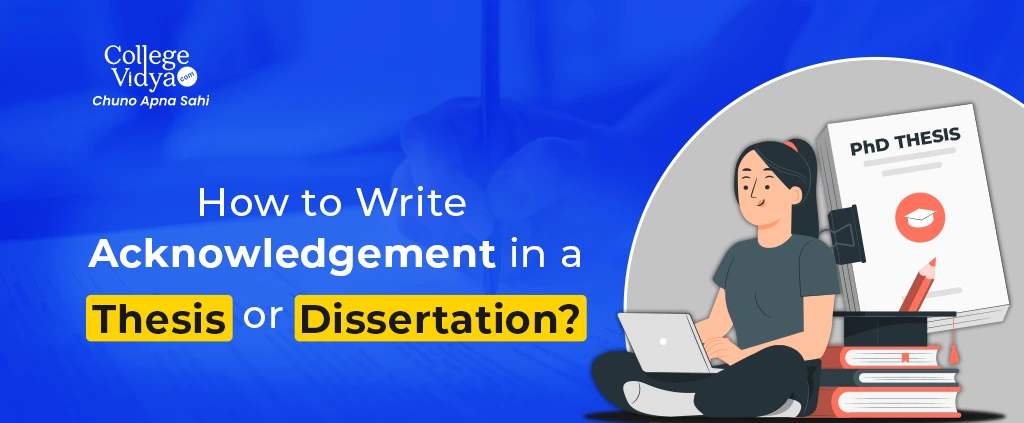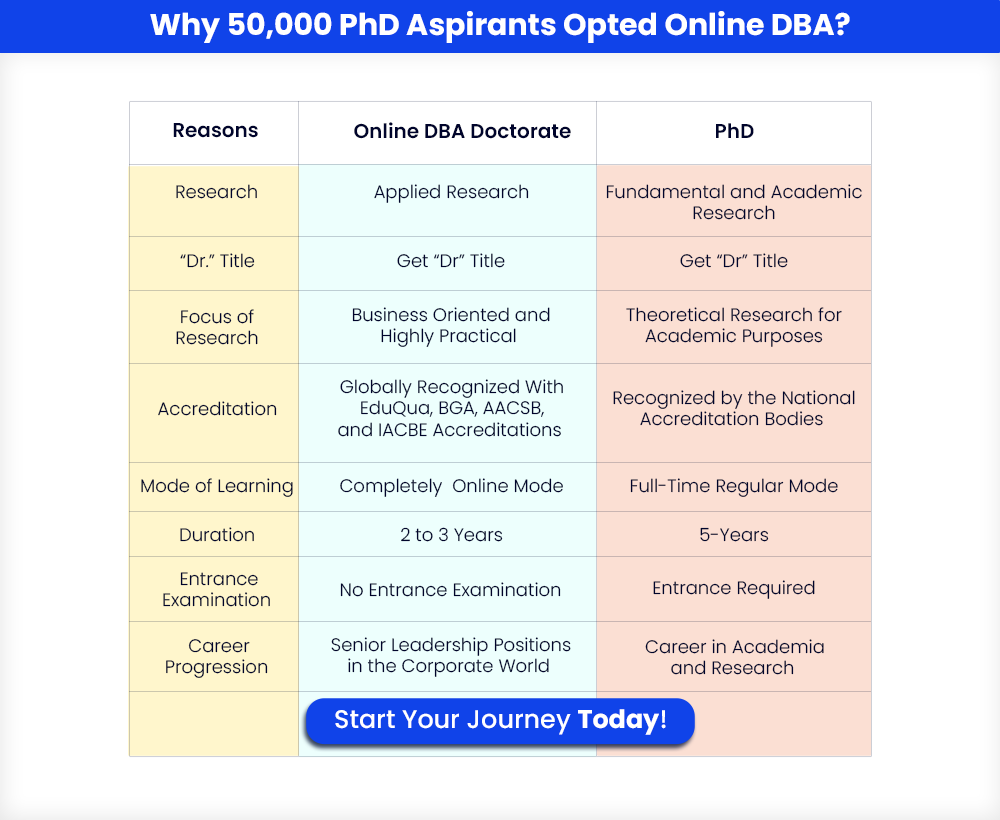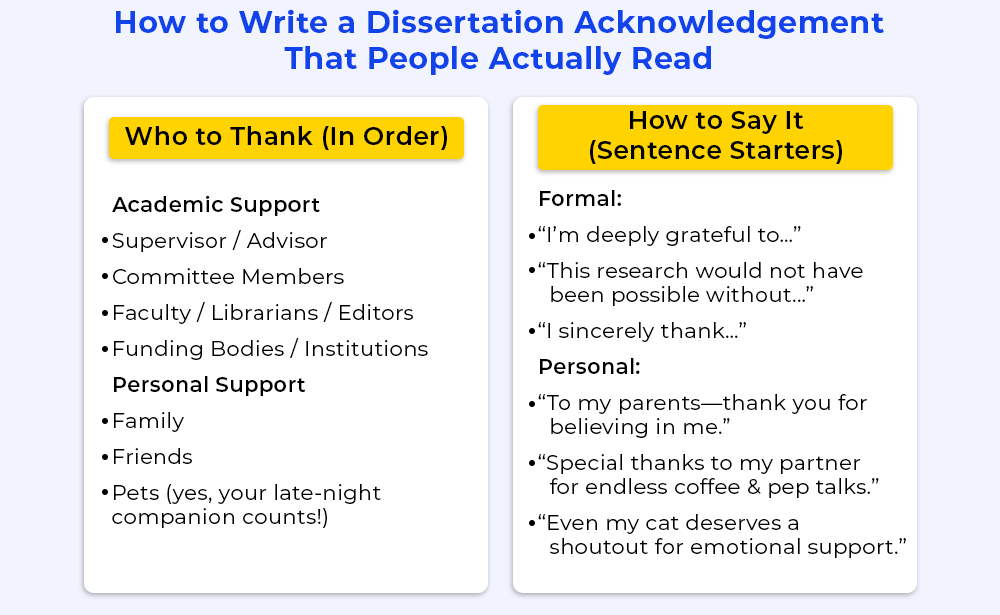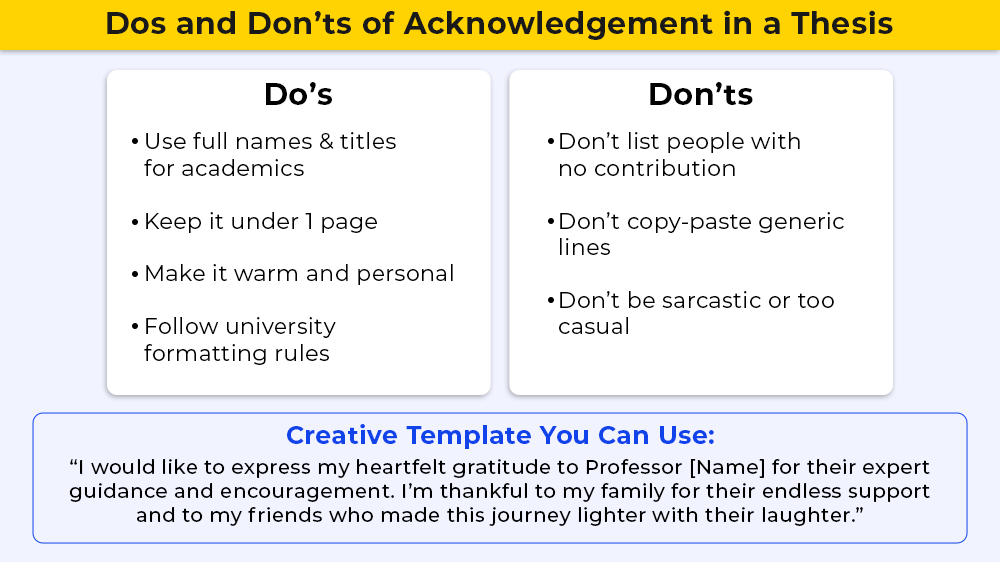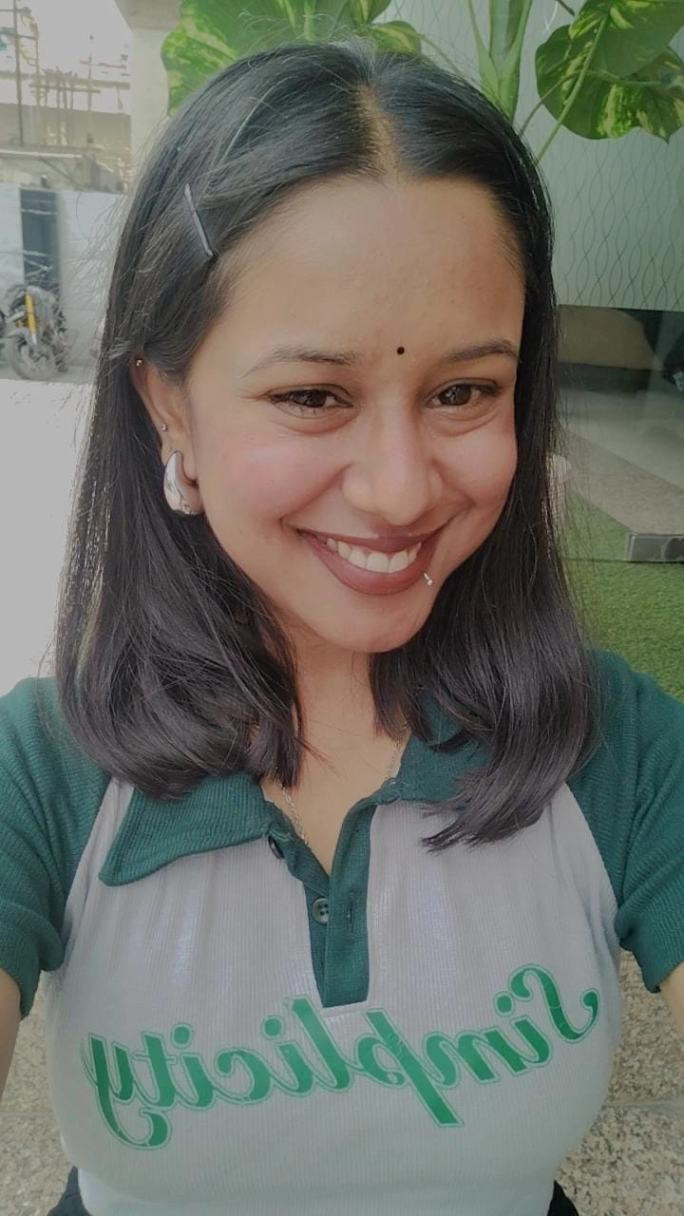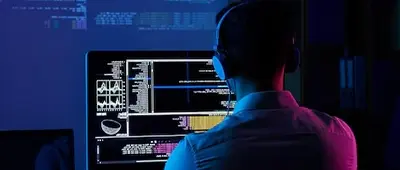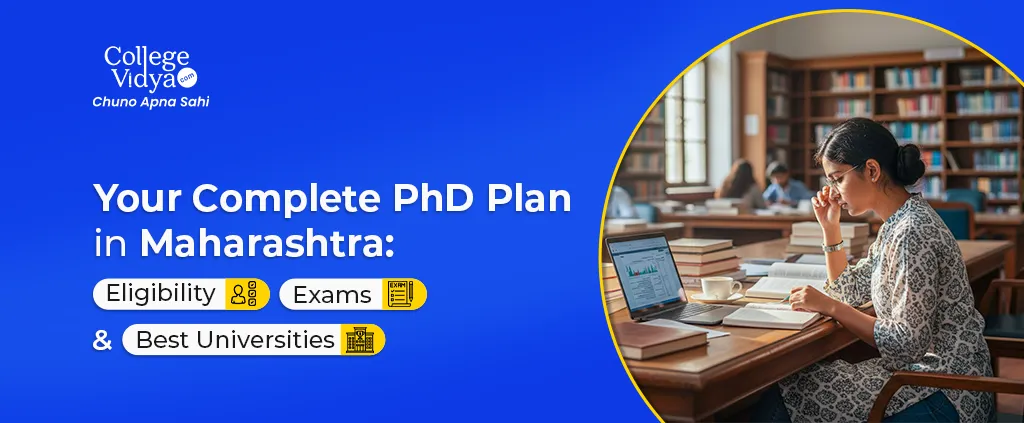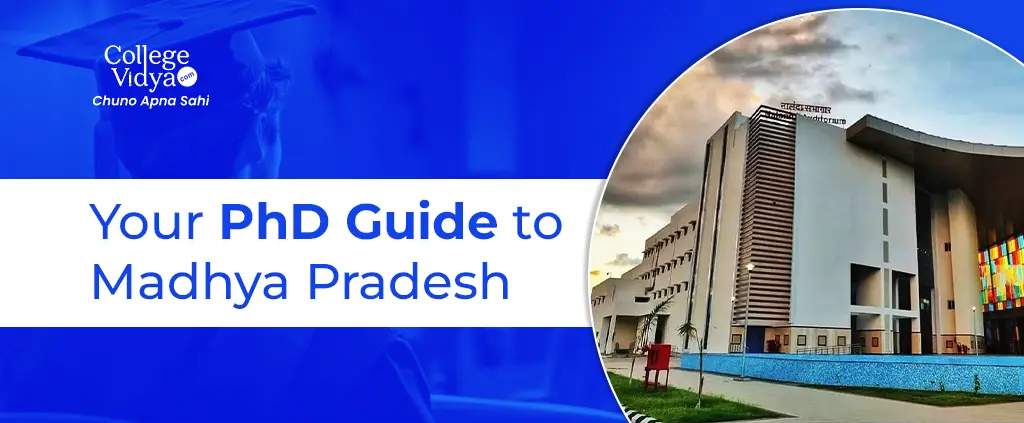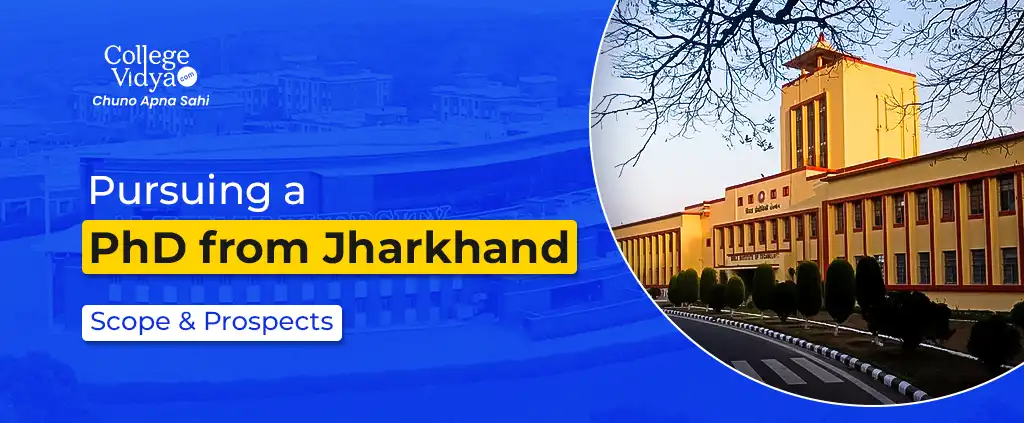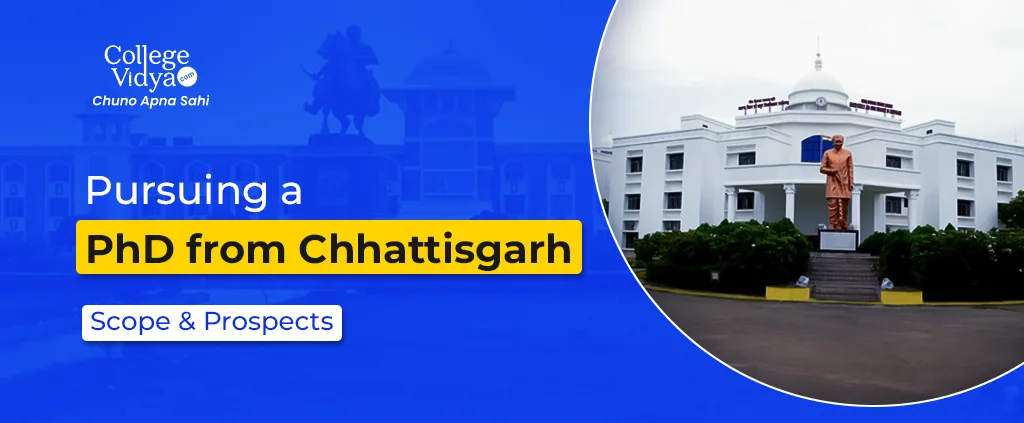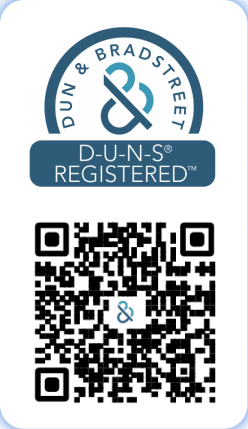The Acknowledgements section is where you thank the people who helped and supported you while writing your thesis or dissertation. It comes after the title page and before the abstract. It should be short, no more than one page. You can write in a more casual and personal way here, using words like “I” and “my.” This part is not marked or judged like the rest of your work. It’s simply your chance to say thank you to those who were there for you during the process.
It can be tough to write a thesis or dissertation. Quite a number of people tend to overlook the Acknowledgement section, but it is so important. Funny, most of them miss the opportunity to read it! The Acknowledgement section is where you express gratitude toward anybody who gave you support during your studies. Normally, you start by thanking your professors, supervisors, and anyone who may have guided your research, and then you thank your family and friends or anyone who supported you.

Use full names and titles whenever possible; you may also say how a certain person assisted you. One may thank the supervisor for guiding the research or thank an immediate family member for encouraging them through a hard time. It is important to acknowledge if brilliant comments were offered by someone exceptional within your field, as this, indeed, heightens the value of your effort.
All Acknowledgements are slightly different, and it is fine. Just be sure to refer to the guidelines of your university before writing your acknowledgements. This blog will give some simple pointers on how to fashion a heartfelt and thoughtful Acknowledgement page.
Many students, especially those pursuing advanced degrees like a PhD or an Online DBA, often mention their supervisors, advisors, or industry mentors in their acknowledgements. Whether you’re on a traditional academic path or balancing a career while completing your Online DBA, acknowledging those who supported you professionally or personally adds a personal and sincere touch to your dissertation.”
What is your thesis Acknowledgement?
Acknowledgements in a thesis are a section where you thank people who have contributed and supported you with all the research work and writing. You can thank people in two ways:
Professional Acknowledgements – These encompass your supervisor, teachers, researchers, or anyone from your university or organization involved in or assisting with your study. You might also wish to thank a particular funding body or institution that supported your work.
Personal Acknowledgements – Include anyone in your family, friends, or persons who just offered emotional support or assisted with the final proofing. This area is usually written more informally and in the first person (many times, using “I”). This will enter at the very beginning of the thesis, generally before the abstract or table of contents.
How long should a thesis Acknowledgement be?
It depends. Some people keep it short and only thank those who directly helped with their research. Others may write a longer list, including everyone who supported them during the process.
But it’s best to keep it short and focused. Don’t make it a long list of names. Just include those who made a real difference in your work.
A simple thank-you to each person is a nice way to show appreciation without making it too long. Remember: the main part of your thesis is your research, so keep this section meaningful but brief.
How to Write Acknowledgements
Writing the Acknowledgements section of your thesis is your chance to say thank you to everyone who helped you.
Step 1: Make a List of People
First, think of all the people who helped you. Then, group them into three types:
- Major Thanks – People who made your work possible. This could be your advisor, thesis guide, committee, or funders.
- Big Thanks – People who helped you a lot but were not the main contributors. This could be classmates, librarians, or lab assistants.
- Minor Thanks – People who gave you emotional support. This could include your family, friends, or even your pet.
Step 2: Use Simple and Nice Words
When writing, use different ways to start your sentences so it doesn’t sound boring. Here are some sentence starters you can use:
For Major Thanks:
- I am deeply thankful to…
- I would like to express my deepest gratitude to…
- This work would not have been possible without…
- I could not have completed this journey without…
For Big Thanks:
- Many thanks to…
- Special thanks to…
- I am also thankful for…
- I would like to acknowledge…
For Minor Thanks:
- I’d like to thank…
- I’d like to mention…
- I had the pleasure of working with…
- I’d like to recognise…
Step 3: Combine Them Well
- A simple way to write is: Sentence starter → Person’s name or title → What they did for you
- Example: “I would like to express my deepest gratitude to Dr. Meera Sharma for guiding me at every step of my research.”
- Ending Your Acknowledgements: You don’t need to write a conclusion. Just finish with your last thank-you.
Writing your Acknowledgements in this way will make it easy to read and feel warm and personal. Keep it short, sweet, and respectful.
Things to Remember When Writing Your Dissertation Acknowledgements
When you reach the Acknowledgements section of your dissertation, it might feel like the hard part is done. You may think writing thank-yous is easy. But this section is important.
Many people, including future employers, will read your Acknowledgements. So, take it seriously.
Tip: Keep your Acknowledgements short, honest, and heartfelt.
This section shows who truly helped you succeed in your work. It’s a lasting way to thank them. Some people even feel so proud, they print and frame it!
So write with care. Make your message clear, kind, and special.
Simple Examples of Dissertation Acknowledgement
One of the best ways to write your own acknowledgements is to read how others have written theirs. Look at what feels warm, honest, and clear and then use that as a guide.
Example 1 (Simple & Heartfelt)
-
I could not have completed this without the help of many kind people. I want to thank them from the bottom of my heart.
- First, I want to thank my dissertation committee. Dr. Elaine Gooding and Dr. Matthew Hunter shared great advice and helped me stay on track. A very special thanks to Dr. Fiona Moore, my supervisor. Her support and knowledge guided me every step of the way.
- Next, I thank my partner, Elliott. You always cheered me on when I felt low. I couldn’t have done this without your love.
- Finally, thank you to my family and friends. Your love and support meant so much. We made it!
Example 2 (Short & Clear)
-
Many people helped me reach this goal, and I would like to thank them.
- A big thank you to Dr. Ronald Saulk, my guide, for his endless support and wise advice. I also thank the Wilhelm Library team for all their help, from finding books to keeping the coffee warm it all mattered.
- Lastly, thank you to my family and God for being there for me always.
One Last Thought: Enjoy Writing
Writing your Acknowledgements is a special part of your dissertation. It’s your chance to thank the people who supported you. It’s also one part where you can be yourself, write in your own voice, and even have a little fun. This moment doesn’t come often, so enjoy it.
Acknowledgements: The Basics
The thesis or dissertation Acknowledgements give the chance to thank the people who have stood by you. These sections are short (usually a page) and less formal as compared to other parts of a paper, but the Acknowledgements should not be overlooked. In general, it starts with a thank-you speech to all persons involved in guiding your research, including your supervisor, guide, and other academic staff. Agencies and organisations might then be thanked for funding your work. Finally, you could acknowledge your peers and colleagues who contributed ideas or participated in discussions, and then go on to thank your family, friends, and even pets for all the personal support through your studies.
The logic behind this is from the most formal to the most personal. Most students start by thanking their supervisors, who have been in charge of guiding and reviewing the work. However, always check your university for its rules since some universities might want their Acknowledgements arranged differently.
Let's take a look at a few very simple examples:
Example 1: Formal and Professional
I would like to thank my supervisor, Professor Jane Smith, for her constant support and advice. Her feedback helped me improve my work. I also thank Dr. John Doe and Dr. Emily White, who gave me important suggestions. Thanks to the Biology Department at University College London for their support. I am grateful to my classmates for the helpful discussions and encouragement.
Lastly, I thank the technical team who helped with lab equipment. Their support was very important for my experiments.
Example 2: Warm and Personal
Many people helped me reach this goal, and I thank them all. My thanks to Dr. Ronald Saulk, my guide, for all the support and wise advice. I am also grateful to the staff of the Wilhelm Library for all their assistance in everything, from locating books to keeping the coffee warm. It all mattered.
Last but not least, I thank my family and God for their continuous support.
One Last Thought: Enjoy Writing It
Writing your Acknowledgements is one of those special parts of your dissertation. It is your chance to thank important people who stood behind you. It is a rare moment where you can let your hair down and be yourself, express everything in your own voice and have some fun with it. So, savor it.
Example 3: With Personal & Academic Challenges
This journey had many ups and downs. I thank my supervisor, Dr. Lisa Green, who always believed in me and helped me when things were hard.
I also thank my family for their emotional and financial support during difficult times. You gave me strength.
Thank you to the university counseling team, who helped me stay focused and manage stress. All of you showed me that learning is not a solo path – it’s a team effort.
Example 4: University Support Focus
Thanks to the University of Edinburgh Scholarship, which allowed me to do this research without financial stress. Big thanks to Professor Richard Miles, my advisor, for his expert guidance in microbiology. I also thank the library staff who helped me find useful books and articles. The admin and tech teams also supported me, even if we don’t often thank them enough. And thank you to my classmates for encouraging me and making my time at the university great.
Example 5: Reflective and Philosophical
Doing this thesis was not just about study it helped me grow as a person too. Thank you to Professor Sarah Johnson, who made me think deeply and ask big questions. My classmates in the Philosophy Department helped me look at things in new ways through our talks and debates.
I thank my family, who made me curious about learning and supported me from the start. Their deep questions at home inspired me to study philosophy. This thesis is not just mine it belongs to everyone who helped me. It taught me the value of questions and new ideas.
Final Tip: Enjoy the Process
Writing the Acknowledgements is a special moment. You don’t write a thesis every day and this is your chance to thank the people who helped you. Be honest, be yourself, and enjoy it. Some people even frame their Acknowledgements because they feel so proud to be part of your journey.
What is an Online DBA? Why is WX choosing it?
While writing your thesis or dissertation, you may come across students who are doing something called an Online DBA. But what exactly is it? A DBA stands for Doctor of Business Administration. It is a professional doctorate designed for people who are already working in business or management and want to study at a higher level. An Online DBA allows them to do this from anywhere, without leaving their jobs.
Unlike a traditional PhD, which is more research-based and academic, a DBA is practical. It helps professionals solve real business problems using advanced research and leadership skills. It’s perfect for someone who wants to grow in their career, become a senior leader, or even teach at universities later. Many working professionals, like WX, are choosing an Online DBA because it offers flexibility, quality education, and career growth. WX says:
“I needed a program that lets me learn while I continue to work. The Online DBA gives me the best of both education and experience together.” WX is also choosing the Online DBA because of its focus on industry-based learning. The program allows students to explore real-world issues in their own companies or industries. This makes learning immediately useful. The structure of most Online DBA programs includes video lectures, live sessions with experts, one-on-one mentorship, and a major final research project.
For example, in the acknowledgements of a thesis, students like WX often thank supervisors, mentors, and even coworkers who supported their Online DBA journey. These students are often balancing work, study, and personal life, so their support system matters a lot.
Also, WX values the fact that an Online DBA is approved and widely accepted by employers in India and abroad. This gives confidence that the degree is credible and respected.
In short, an Online DBA is not just a degree; it is a career step forward. Whether you’re writing a traditional dissertation or doing an Online DBA thesis, saying thanks to the people who supported you makes your journey even more special.
And for students like WX, the Online DBA is the perfect path to success one that fits their goals, schedule, and professional dreams.
Conclusion
Writing the Acknowledgements in your thesis or dissertation is a small but meaningful step. It’s your chance to say thank you to everyone who helped and supported you. From your teachers and supervisors to your family and friends, each person played a role in your journey. This section is short, warm, and personal, and lets you express your gratitude in your own words. Whether you're doing a PhD or an Online DBA, this part of your work shows how learning is never done alone. So take your time, be honest, and write from the heart. It truly matters.

